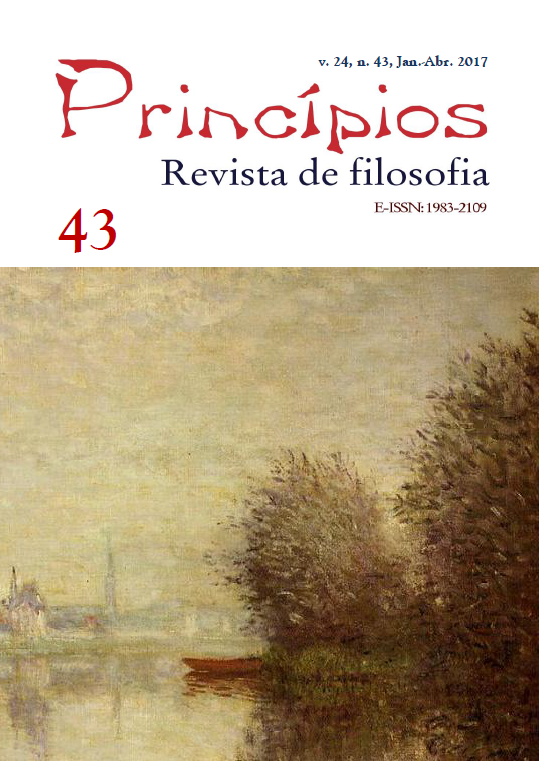El profundo sustrato de la Ciencia y el fértil humus de las ciencias [The deep substrate of the Science and the rich humus of the sciences]
DOI:
https://doi.org/10.21680/1983-2109.2017v24n43ID11716Palavras-chave:
Idealismo Alemán, Kant, Hegel, Metafísica, Ciencia (Lógica), Matemática, Ciencias experimentales [German Idealism, Metaphysics, Science (Logic), Mathematics, Experimental Sciences]Resumo
Este ensayo atiende al momento seguramente más ambicioso de la historia de la filosofía: la conversión, en el seno del Idealismo Alemán del modus exponendi de aquélla, primero en Crítica (Kant), luego en Doctrina (Fichte), en Sistema (Schelling), y finalmente en Ciencia (Hegel), al mismo tiempo que, en el modus componendi, la Metafísica se transfigura en Lógica. Ello supone, contra una interpretación manualística ya apenas seguida, no abandono o menosprecio por parte de Hegel de las ciencias experimentales, sino al contrario: una minuciosa utilización de las mismas como origen, condición y material de elaboración del propio desarrollo lógico, de manera que, mientras el plano de la exposición (el methodus) permanece relativamente fijo, el de la composición, mediado por la Realphilosophie, se modifica y altera al ritmo de las teorías y los acontecimientos del día de los hombres, como si su “peso” fuera dejando una huella en el reino lógico de las sombras.
[This paper examines the probably most ambitious moment of the history of philosophy: the transformation, at the center of the German Idealism, of Philosophy into Critique (Kant), Doctrine (Fichte), System (Schelling) and finally Science (Hegel), as regards the philosophical modus exponendi, and simultaneously the transfiguration of Metaphysics into Logic, in its modus componendi. Rejecting the old-fashioned handbook interpretations, I claim these transformations do not make Hegel neglect or contempt the experimental sciences. On the contrary, they prove he meticulously used the experimental sciences as origin, condition and elaboration material of the logical development, so that while the exposition level (methodus) remains relatively firm, the composition level, mediated by the Realphilosophie, is modified and altered according to the human theories and the human daily events, as if its "weight" left its traces in the logical realm of shadows.]
Downloads
Referências
BARDILI, Christoph Gottfried. Grundriss der Ersten Logik gereiniget von den Irrthümern bisheriger Logiken überhaupt, der Kantischen insbesondere; Keine Kritik sondern eine Medicina Mentis, brauchbar hauptsächlich für Deutschlands Kritische Philosophie. Stuttgart: Löfflund, 1800. (reimpr. en Culture et Civilisation. Bruselas, 1970).
FICHTE, Johann Gottlieb. Werke. Ed. I. H. Fichte. Berlín: de Gruyter, 1971.
HEGEL, Georg Wilhelm Friedrich. Philosophie der Weltgeschichte. Erster Band: Die Vernunft in der Geschichte. Ed. G. Lasson. Leipzig: F. Meiner, 1944.
HEGEL, Georg Wilhelm Friedrich. Werke (= W.). Frankfurt/M.: Suhrkamp, 1970.
HEGEL, Georg Wilhelm Friedrich. Gesammelte Werke (= G.W. ). Düsseldorf: [s.n.], 1980.
KANT, Immanuel. Gesammelte Schriften (= Ak.). Ed. Königlich Preussische Akademie der Wissenschaften. Berlín: G. Meiner, 1902.
KANT, Immanuel. Kritik der reinen Vernunft. Ed. R. Schmidt. Hamburgo: F. Meiner, 1976.
MENDELSSOHN, Moses. Morgenstunden oder Vorlesungen über das Daseyn Gottes - Vorbericht [1785]. En: MENDELSSOHN, Moses. Gesammelte Schriften. Jubiläumsausgabe. Stuttgart: Frommann-Holzboog, 1974.
SCHELLING, Friedrich Wilhelm J. Sämmtliche Werke ( = S.W.). Stuttgart; Augsburg: J. G. Cotta, 1858.
SOPHOKLES, Antigone. Oxford: Oxford University Press, 1958.
Downloads
Publicado
Como Citar
Edição
Seção
Licença
Autores mantêm os direitos autorais e concedem à revista o direito de primeira publicação, com o trabalho simultaneamente licenciado sob a Licença Creative Commons Attribution que permite o compartilhamento do trabalho com reconhecimento da autoria e publicação inicial nesta revista.
Termos da licença:
| Não Comercial (NC) | Os licenciados podem copiar, distribuir, exibir e executar a obra e fazer trabalhos derivados dela, desde que sejam para fins não comerciais. |
| Compartilha Igual (SA) | Os licenciados devem distribuir obras derivadas somente sob uma licença idêntica à que governa a obra original ou menos restritiva. |


 Português (Brasil)
Português (Brasil) English
English Español (España)
Español (España) Français (Canada)
Français (Canada)


